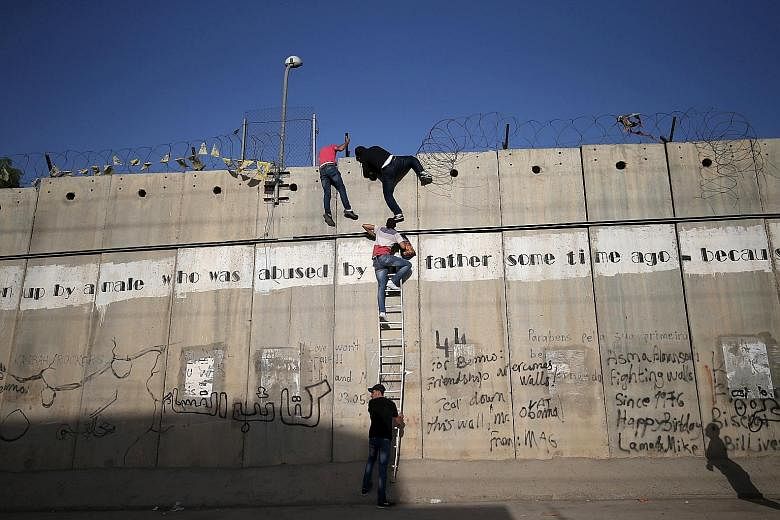PARIS • From Israel's separation barrier to the 4,000km barbed-wire fence India is building around Bangladesh and the huge sand berm separating Morocco from rebel-held parts of the Western Sahara - walls and fences are ever more popular with politicians wanting to look tough on migration and security.
Globalisation was supposed to tear down barriers, but security fears and a widespread refusal to help migrants and refugees have fuelled a new spate of wall-building across the world, even if experts doubt their long-term effectiveness. When the Berlin Wall was torn down a quarter-century ago, there were 16 border fences around the world. Today, there are 65, either completed or under construction, according to Quebec University expert Elisabeth Vallet.
US presidential hopeful Donald Trump has made plans for a wall along the border with Mexico to keep out what he called "criminals, drug dealers, rapists" - central to his inflammatory campaign.
Last month, Hungary's right-wing government began building a 4m-high fence along its border with Serbia to stem the flow of refugees from Syria, Iraq and Afghanistan.
"We have only recently taken down walls in Europe; we should not be putting them up," said one exasperated European Union spokesman. Kenya, Saudi Arabia and Turkey are all constructing border fences in a bid to keep out militant groups next door in Somalia, Iraq and Syria. But despite the aggressive symbolism, it is unclear that walls are truly effective.
-
OTHER WALLS
-
HUNGARY: The government began building a 177km fence along its border with Serbia in July after a record 80,000 asylum applications this year.
MOROCCAN-OCCUPIED WESTERN SAHARA: A 2,700km sand wall separates Moroccan territory from Polisario rebels.
SAUDI ARABIA-IRAQ: A 7m-high sand berm on the Iraqi border is being supplemented with a 900km fence.
ISRAEL-WEST BANK: Israel began building its security barrier in 2002, saying it would stop attacks by Palestinians.
U.S.-MEXICO: Presidential hopeful Donald Trump says he would make Mexico pay to have a wall built along the border.
GREECE-TURKEY: In 2012, Greece built the 11km Evros wall along the boundary with Turkey.
NORTHERN IRELAND: Belfast has 99 "peace lines" designed to separate working-class Protestant and Catholic communities.
INDIA-BANGLADESH: Since 1993, India has been surrounding Bangladesh with a barbed-wire fence aimed at restricting immigration.
CYPRUS: A wall splits the island and its capital Nicosia between its Turkish and Greek Cypriot halves, dating back to Turkey's invasion in 1974.
AGENCE FRANCE-PRESSE
"The one thing all these walls have in common is that their main function is theatre," said Mr Marcello Di Cintio, author of Walls: Travels Along The Barricades. "You can't dismiss that illusion, it's important to people, but they provide the sense of security, not real security."
Supporters of walls say a few leaks are better than a flood. But Mr Di Cintio argued that we must consider the psychological price they exact. He has talked to Bangladeshi farmers suddenly cut off from their neighbours when India erected the simple barbed-wire fence between them in the last decade. Within a few months, he says, they had started expressing distrust and dislike for "those people" on the other side. "I was struck every time at how a structure so simple as a wall or fence can have these profound psychological effects," he added.
Walls are mostly effective against the poorest and most desperate, said University of Hawaii professor Reece Jones, author of Border Walls: Security And The War On Terror In The United States, India and Israel.
"Well-funded drug cartels and terrorist groups are not affected by walls at all because they have the resources to enter by safer methods, most likely using fake documents," he pointed out.
Shutting down border crossings only "funnels immigrants to more dangerous routes", he said.
More than 40,000 people have died trying to migrate since 2000, the International Organisation for Migration said last year.
"With the intense flows of people we see today, walls are perhaps necessary for politicians," said Mr Emmanuel Brunet-Jailly of Canada's University of Victoria. "They tap into old myths about what borders should be - the line in the sand - which humans relate to."
AGENCE FRANCE-PRESSE

